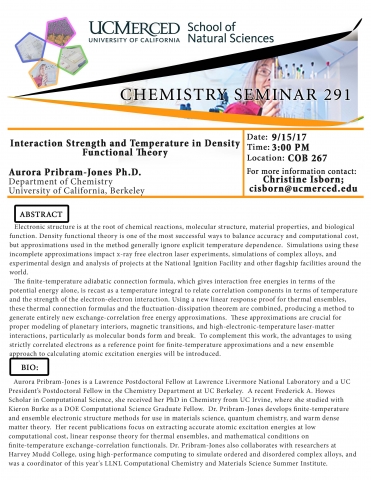September 15, 2017

Aurora Pribram-Jones, Ph.D., University of California, Berkeley
Abstract:
Electronic structure is at the root of chemical reactions, molecular structure, material properties, and biological function. Density functional theory is one of the most successful ways to balance accuracy and computational cost, but approximations used in the method generally ignore explicit temperature dependence. Simulations using these incomplete approximations impact x-ray free electron laser experiments, simulations of complex alloys, and experimental design and analysis of projects at the National Ignition Facility and other flagship facilities around the world.
The finite-temperature adiabatic connection formula, which gives interaction free energies in terms of the potential energy alone, is recast as a temperature integral to relate correlation components in terms of temperature and the strength of the electron-electron interaction. Using a new linear response proof for thermal ensembles, these thermal connection formulas and the fluctuation-dissipation theorem are combined, producing a method to generate entirely new exchange-correlation free energy approximations. These approximations are crucial for proper modeling of planetary interiors, magnetic transitions, and high-electronic-temperature laser-matter interactions, particularly as molecular bonds form and break. To complement this work, the advantages to using strictly correlated electrons as a reference point for finite-temperature approximations and a new ensemble approach to calculating atomic excitation energies will be introduced.
Christine Isborn
Assistant Professor



